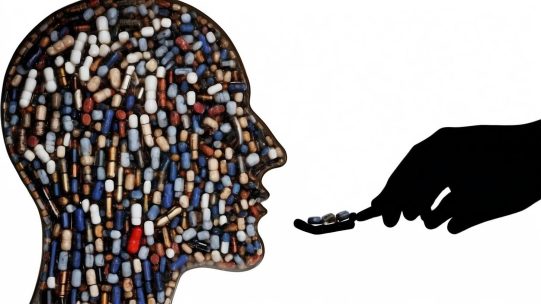Why so many Australians taking antidepressants?

Approximately one in seven Australians are taking antidepressants, and more than 3.5 million people will be prescribed antidepressants in 2021-22. This is one of the highest rates of antidepressant prescribing in the world.
Guidelines recommend antidepressants to treat more severe depression and anxiety, but not as first-line treatment for less severe depression. Antidepressants are less frequently prescribed for conditions such as chronic pain and migraine.
However, prescriptions are on the rise: from 2013 to 2021, the number of antidepressant prescriptions in Australia steadily increased by 4.5 percent per year. So why are so many Australians taking antidepressants and why are prescriptions on the rise?
The evidence suggests that antidepressants are being prescribed far too often. So why is this happening?
The emergence of “blockbuster” antidepressant drugs
In the 1990s, pharmaceutical companies heavily marketed new selective serotonin reuptake inhibitors (SSRIs) – antidepressants such as Prozac (fluoxetine), Zoloft (sertraline) and Lexapro (escitalopram).
These drugs were thought to have a low risk of overdose and would replace tricyclic antidepressants with fewer side effects.
Pharmaceutical companies heavily marketed SSRIs, often exaggerating their benefits by paying advertising fees to high-ranking physicians known as “opinion leaders.” As a result, the market grew significantly.
Over the life of the patent, RSRIs have generated billions of dollars in profits for manufacturers. Although they are now relatively inexpensive, they are still profitable due to the large number of prescriptions.
Why are antidepressants prescribed?
The majority (85%) of antidepressants are prescribed in general practice. Some are prescribed for more severe forms of depression and anxiety. However, contrary to clinical guidelines, GPs also prescribe them as first-line treatment for less severe depression.
GPs also prescribe antidepressants to patients who do not have a psychiatric diagnosis but who are in severe distress. For example, a friend experiencing her husband’s terminal illness was advised by her GP to take antidepressants after a long hospital stay, although her ability to care for him was unimpaired. Another man who cried when he found out he had breast cancer was immediately prescribed antidepressants.
There are a number of reasons why people take antidepressants when they don’t need them. Busy GPs may be looking for a convenient solution to a complex and sometimes intractable problem. Patients may also want to prescribe them. They may be inspired by the positive experiences of people they know, or they may be looking for other ways to improve their mental health.
Most patients believe that antidepressants restore the chemical imbalance underlying their depression. This is not true. Antidepressants are emotionally (and sexually) numbing drugs, sometimes calming, sometimes energizing. Some people get these effects if, for example, their emotions are too raw or they lack energy.
Others experience unpleasant side effects such as insomnia, anxiety, nausea and weight gain. About half of users experience sexual dysfunction, and some continue to experience sexual dysfunction even after stopping antidepressants.
Duration of taking antidepressants
Most experts and guidelines recommend specific prescribing regimens for antidepressants, with durations ranging from a few months to two years.
However, antidepressants are most commonly taken by two categories of people About half of the patients who start antidepressants do not like them and stop taking them within a few weeks. Of those who take antidepressants for a few months, many continue to use them indefinitely, often for years. Long-term use (more than 12 months) is the main reason for the increase in antidepressant prescriptions.
Some people try to stop taking antidepressants, but withdrawal symptoms prevent them from doing so. Withdrawal symptoms – such as “lethargy,” dizziness, anxiety, lightheadedness and vomiting – can cause severe distress, impaired performance and relationship breakdown. In 14 studies investigating antidepressant withdrawal, about 50% of users experienced withdrawal symptoms when quitting antidepressants, which could be mistaken for a relapse of the original problem. We are conducting a survey to better understand the experience of antidepressant withdrawal in Australia.
Antidepressants should not be stopped abruptly, but should be withdrawn gradually and in smaller doses. The recently published Maudsley Deprescribing Guidelines in Australia provide guidance on the complex regimes required for antidepressant withdrawal.
We need to change attitudes towards mental health disorders.
The over-prescribing of antidepressants suggests that we are not paying attention to the social determinants of mental health. Being poor (especially when your neighbor seems rich), unemployed or in a terrible job, under housed, or afraid of domestic violence is depressing. It is wrong to think that the problem lies in the individual, whereas it lies in society.
Over-prescribing medication is also a symptom of the medicalization of suffering. Most diagnoses of depression and anxiety are descriptions masquerading as explanations. Symptoms mean different things to each person experiencing distress that fits into the pattern of anxiety or depression. There may be a medical explanation, but often meaning can be found in life circumstances, such as struggling with difficult emotions, relationships, terrible disappointments or sadness.
Over-prescribing by GPs reflects workload pressures, unrealistic expectations of competence and misinformation from pharmaceutical companies and key opinion leaders GPs need better support, resources and evidence of the limited effectiveness of antidepressants.
GPs also need to discuss with their patients the possible side effects of antidepressants and how and when they can be safely withdrawn.
However, the underlying problems are social in nature and can only be adequately addressed by seriously tackling inequalities and changing societal attitudes to distress.










Comment